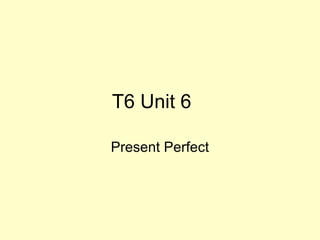
19027575 t6-unit-6-present-perfect
- 1. T6 Unit 6 Present Perfect
- 7. Have you ever … ? We use the PRESENT PERFECT to talk about our EXPERIENCE without saying when. What about you? Have you ever played with a dolphin? Yes, I have. / No, I haven’t. Ex: John has played with a dolphin.
- 8. To form the PRESENT PERFECT use the auxiliary HAVE and the past participle of the main verb. If the main verb is a regular verb, the past participle is formed by adding –ed. If the main verb is an irregular verb, you have to learn its past participle!! (3rd column) Regular verb (ex: play) I have played You have played He / She has played We have played You have played They have played Irregular verb (ex: see) I have seen You have seen He / She has seen We have seen You have seen They have seen
- 9. Show you have undertsood! Eric ... Eric has held a tarentula in his hand. What about you? Yes, I have held a tarentula in my hand. No, I have not / never held a tarentula in my hand. hold a tarentula in his hand (hold-held-held)
- 10. Sandra ... Sandra has sung in public. What about you? Yes, I have sung in public. No, I have not / never sung in public. sing in public (sing-sang-sung)
- 11. Adam ... Adam has burst into laughter in class. What about you? Yes, I have burst into laughter in class. No, I have not / never burst into laughter in class. burst into laughter in class (burst-burst-burst)
- 12. Andrew ... Andrew has delivered a speech in public. What about you? Yes, I have delivered a speech in public. No, I have not / never delivered a speech in public. deliver a speech in public
- 13. Ted ... Ted has sleepwalked. What about you? Yes, I have sleepwalked. No, I have not / never sleepwalked. sleepwalk
- 14. Joe ... Joe has dyed his hair. What about you? Yes, I have dyed my hair. No, I have not / never dyed my hair. dye his hair
- 15. Peter ... Peter has tried skydiving. What about you? Yes, I have tried skydiving. No, I have not / never tried skydiving. try skydiving
- 16. Amy ... Amy has seen the eruption of a volcano. What about you? Yes, I have seen the eruption of a volcano. No, I have not / never seen the eruption of a volcano. see the eruption of a volcano (see-saw-seen)
- 17. Cindy ... Cindy has acted in a film. What about you? Yes, I have acted in a film. No, I have not / never acted in a film. act in a film
- 18. Marc ... Mark has ridden a camel. What about you? Yes, I have ridden a camel. No, I have not / never ridden a camel. ride a camel (ride-roden-ridden)
- 19. Helen ... Helen has touched a snake. What about you? Yes, I have touched a snake. No, I have not / never touched a snake. touch a snake
- 20. Emily ... Emily has been to New York City. What about you? Yes, I have been to New York City. No, I have not / never been to New York City. BE CAREFUL! Emily has been to New York City She is not in N.Y. anymore. Emily has gone to New York City She is still in N.Y.! go to New York City (go-went-gone) be to New York City (be-was/were-been)
- 21. WRITE SENTENCES WITH PRESENT PERFECT.
- 22. 1.he / lose / his passport + 2.you / ever / see / a whale ? 3. she / not see / her sister -
- 23. 5. they / have / a Mexican food ? 6. I / not do / any homework - 7. they / buy / a house +
- 24. 9. he / ever / make / any mistakes ? 10. we / finish / our work + 11. I / meet / a famous person +